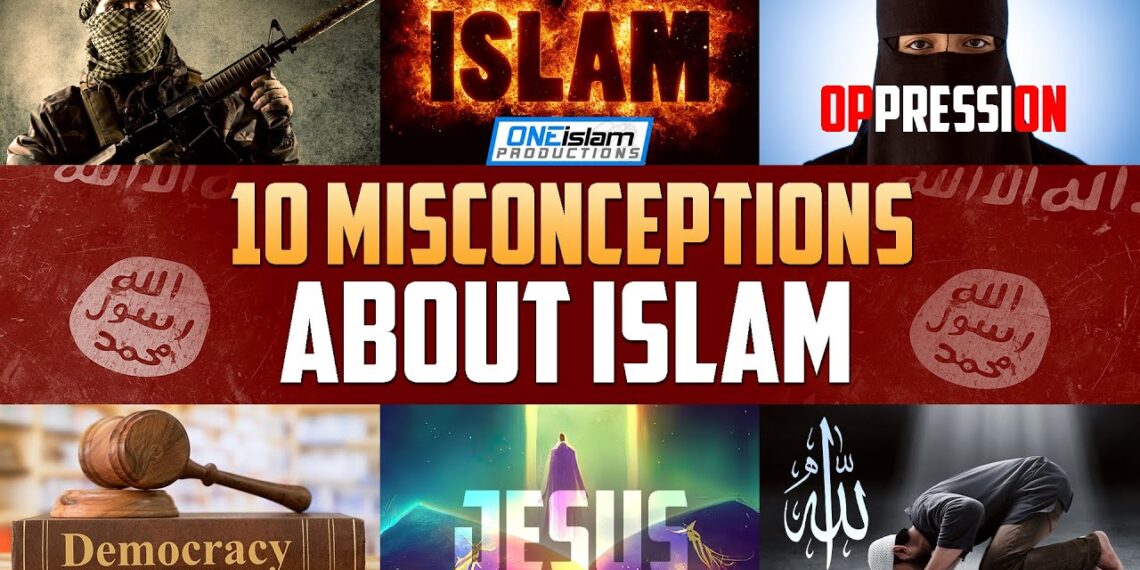This content discusses 10 common misconceptions about Islam and the Muslim community. It highlights that Islam promotes peace and condemns violence, and that Muslims come from diverse backgrounds, not just Arab countries. It also addresses the misconception that women are oppressed in Islam, clarifying that Islam promotes gender equity and grants women rights and protections. Moreover, it states that Muslims worship the same God as Christians and Jews, and that wearing the hijab is a personal choice. The content also challenges the misconception that Islam is a backward religion, emphasizing its contributions to education and scientific advancements. It dismisses the belief that Muslims are not patriotic and clarifies that Islam discourages polygamy unless specific conditions are met. The content strongly condemns associating Islam with terrorism and highlights that Muslims actively engage with other communities. It concludes by emphasizing the importance of challenging misconceptions and promoting inclusivity and tolerance.
10 Common Misconceptions About Islam and the Muslim Community
1. Islam Promotes Violence
One of the most pervasive misconceptions is that Islam is a violent religion. However, this is far from the truth. Islam actually promotes peace and condemns violence. The term “Jihad” often misleads people, as it is misunderstood to mean “holy war.” In reality, Jihad refers to the internal struggle to maintain faith and do good deeds. Islam encourages believers to live harmoniously with others and to treat everyone with kindness and respect.
2. All Muslims are Arabs
While it is true that the majority of Muslims are from Arab countries, Islam is a global religion with followers from diverse backgrounds. Muslims can be found in almost every country around the world. There are Muslims of various ethnicities, including Asians, Africans, Europeans, and Americans. Islam transcends national and cultural boundaries, uniting people from different parts of the world.
3. Women are oppressed in Islam
Another common misconception is that women are oppressed in Islam. In reality, Islam promotes gender equity and the empowerment of women. The teachings of Islam emphasize the importance of treating women with respect and dignity. While some cultural practices may not align with Islamic values, they should not be mistaken as religious requirements. In fact, Islam granted women rights and protections more than 1,400 years ago, such as inheritance rights and the right to own and manage property.
4. Muslims worship a different God
It is often wrongly assumed that Muslims worship a different God than Jews and Christians. However, Islam teaches the belief in one God, known as Allah, who is the same God worshiped by Christians and Jews. While there may be theological differences among these religions, their fundamental belief in the same God is a uniting factor.
5. Muslims are forced to wear the hijab
The hijab, or headscarf worn by some Muslim women, is often misunderstood as a symbol of oppression or forced modesty. However, wearing the hijab is a personal choice and a form of religious expression for many Muslim women. In several Muslim-majority countries, women can choose whether or not to wear it. It is crucial to recognize that hijab does not define a woman’s intelligence, capabilities, or worth. It is only one aspect of a person’s identity.
6. Islam is a backward religion
Islam is sometimes falsely labeled as a backward or outdated religion. However, Islam’s teachings were remarkably progressive for the time of its revelation and continue to promote values of justice, equality, and the pursuit of knowledge. Islam emphasizes the importance of education and encourages its followers to seek knowledge in various disciplines. Many scientific advancements made during the Islamic Golden Age still influence our understanding in fields like medicine, astronomy, and mathematics.
7. Muslims are not patriotic
Contrary to popular belief, Muslims can, and often do, demonstrate love and loyalty to their countries of citizenship. Islam encourages followers to be law-abiding citizens and contribute positively to the societies they live in. Muslims around the world engage in various fields, such as politics, medicine, sports, and arts, striving to make positive contributions to their communities.
8. Muslim men can have multiple wives
While it is true that Islam allows Muslim men to have multiple wives under certain conditions, this practice is not commonplace or mandatory. In most Muslim-majority countries, polygamy is restricted and subject to specific legal requirements. Additionally, Islam emphasizes the importance of justice and fair treatment towards all spouses, making it a challenge for many individuals to meet these conditions.
9. All Muslims are Arab terrorists
One of the most harmful misconceptions is the association of Islam with terrorism. It is essential to recognize that terrorism knows no religion and should not be attributed to all Muslims. Terrorist organizations misrepresent the teachings of Islam to serve their own twisted agendas. The actions of a few extremists do not define the beliefs and practices of over 1.8 billion Muslims worldwide. Islam, like any other major religion, strongly condemns acts of violence and terrorism.
10. Muslims are closed-off from other communities
Islam encourages Muslims to engage with diverse communities and build bridges based on mutual respect and understanding. Many Muslim organizations, mosques, and individuals actively seek interfaith dialogue to foster peaceful coexistence. Muslims are an integral part of the global community, and they strive to contribute positively while maintaining their Islamic values.
It is crucial to challenge misconceptions and stereotypes about Islam and the Muslim community. By seeking accurate information and engaging in meaningful conversations, we can foster a more inclusive and tolerant society.








